
Money & the World
Measuring the TSX Index: What the Data Tells Us About Canada
We love mining, might be sexist, and other things we learned in our nerd's guide to Canada’s benchmark stock index.
Wealthsimple makes powerful financial tools to help you grow and manage your money. Learn more
We love geeking out on numbers at Wealthsimple. One of the numbers people ask me about a lot is the TSX Composite Index. When people talk about “how the stock market is doing” in Canada, they often talk about the TSX Index. But to most people, it’s just an abstract number. The most basic thing to understand about that number is that it represents the stock prices of the largest 240 companies (measured by market capitalization) that are traded on the Toronto Stock Exchange. When that number goes up, people say the stock market is doing well. When that number goes down, they say it isn’t. But if you go inside the numbers, the Index is also a kind of snapshot of the country. If you understand the companies that make up the TSX, you’ll not only better understand what you’re investing in (among the most common exchange-traded funds track the TSX Index); you’ll understand the economy and business culture of Canada.
I started wondering what we’d learn if we dug into the data contained in that single number. Here’s a quick guide to what I discovered.
Canada Really Likes Mining and Banking
The first question I wanted to answer was: What does Canada do? To figure it out, I grouped each company in the Index according to the industry it's in.

Sign up for our weekly non-boring newsletter about money, markets, and more.
By providing your email, you are consenting to receive communications from Wealthsimple Media Inc. Visit our Privacy Policy for more info, or contact us at privacy@wealthsimple.com or 80 Spadina Ave., Toronto, ON.
The Index spans many sectors, from financial services to health care, but it's largely concentrated in a few. Commodities companies (like Centerra Gold, a gold-mining company, and Suncor Energy, which produces oil) make up a full 42% of the Index. Financial firms—banks, real estate trusts, and other investment firms—make up another 20%. Taken together, these two sectors make up 62% of all the companies in the TSX.
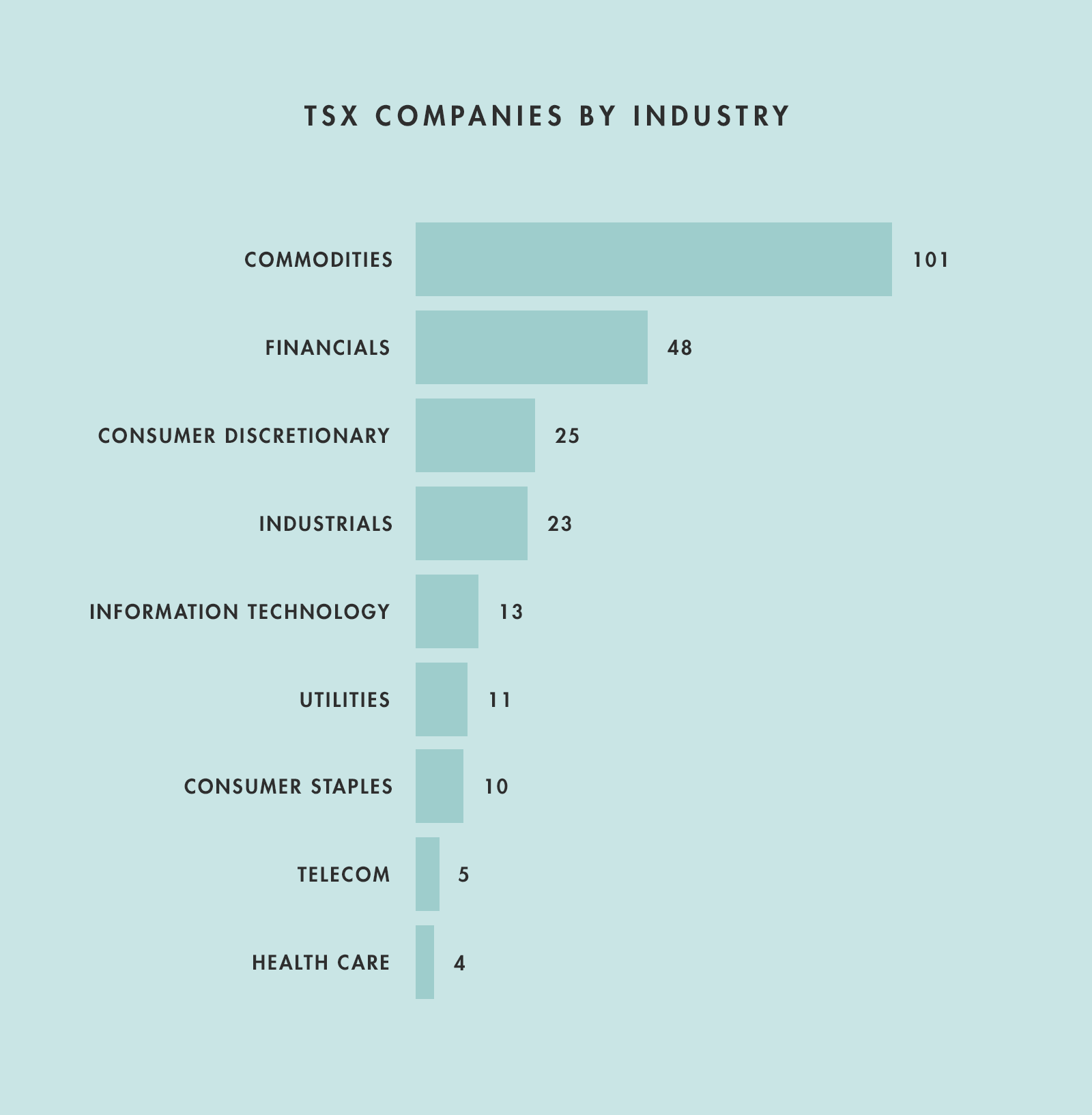
If you’re accounting not just for the number of companies in the Index but also for the size of the companies, finance is particularly dominant. Financial institutions account for six of the 10 largest companies (by market capitalization). Each of the three largest companies (Royal Bank of Canada, Toronto–Dominion Bank, and Scotiabank) are financial firms.
Meanwhile, only three of the 10 largest companies in the United States (Berkshire Hathaway, Wells Fargo, and JPMorgan Chase) are in the financial sector. None of them are in the top three.
In the United States, the three largest companies are all technology firms—a much less dominant sector in Canada.
Canadian Companies Are Younger Than Actual Canadians
As a young company ourselves, we naturally wondered: How closely related are age and success? How long have all of these companies been around?
Recommended for you
Hudson's Bay Company and North West Company were founded in 1670 and 1779 respectively. The two competed fiercely in the fur trade in the eighteenth and nineteenth centuries and even engaged in several armed skirmishes. (If you’re interested in what the early days of these companies were like, The Revenant is about a man who worked for Hudson's Bay.) Today, they're the oldest companies in the TSX Index, but they don’t fight over pelts anymore; they operate various retailers throughout North America.
Despite their colourful history, these companies are not representative of the Index. Overall, the members TSX Index are quite young. Several of them were founded as recently as 2014. Only 25% were founded before 1968.
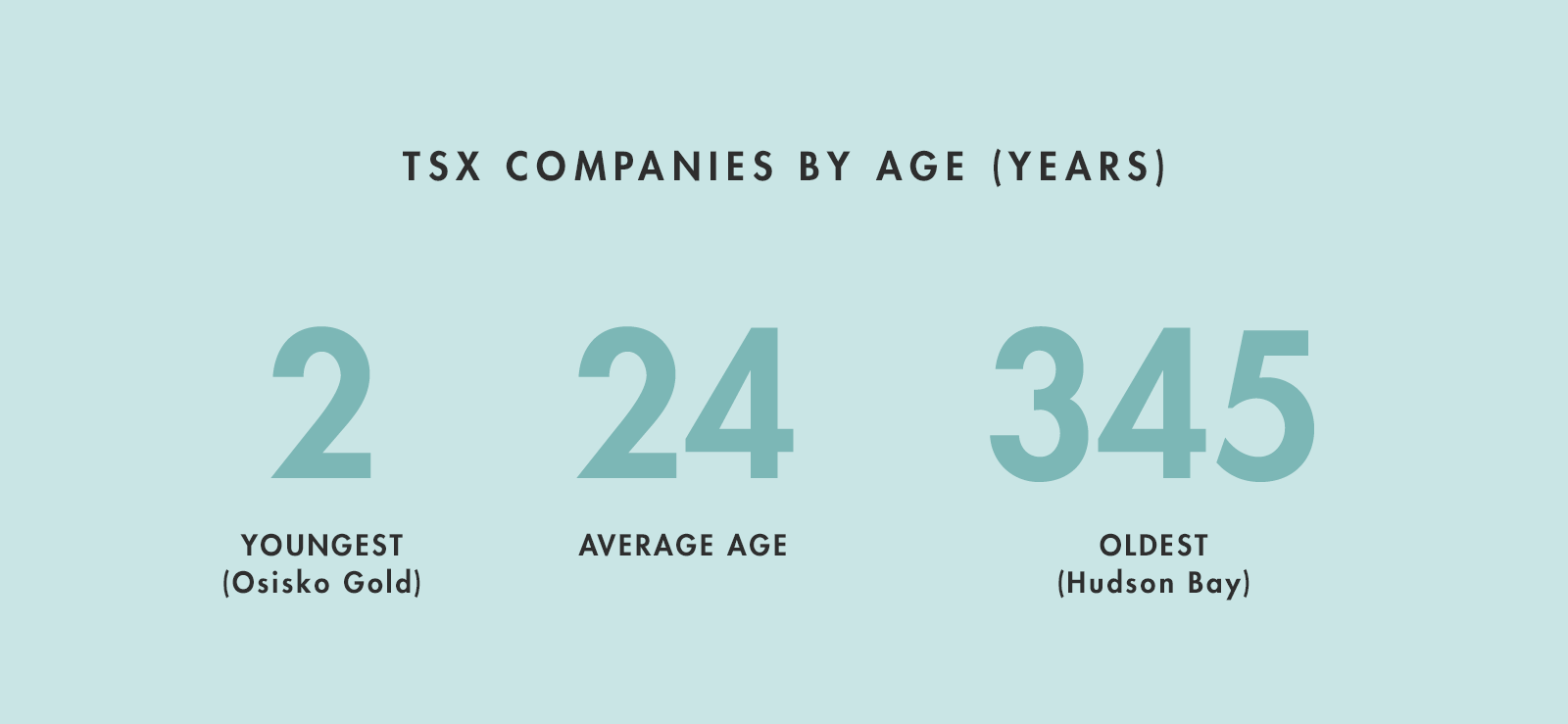
So just how young are Canadian companies? The median age of Canadians is 40 years old. The average company in the TSX Index is just 24 years old (founded in 1992).
There May Be a Glass Ceiling in Canada
The TSX index isn't doing well putting women in leadership roles. Among the 240 companies that comprise the Index, only seven of them have female CEOs: Dream Global Real Estate Investment Trust, TransAlta Corporation, Just Energy Group, Dundee Real Estate Investment Trust, ATCO Ltd., Linamar Corporation, and Canadian Utilities Ltd. That represents just under 3% of the Index.
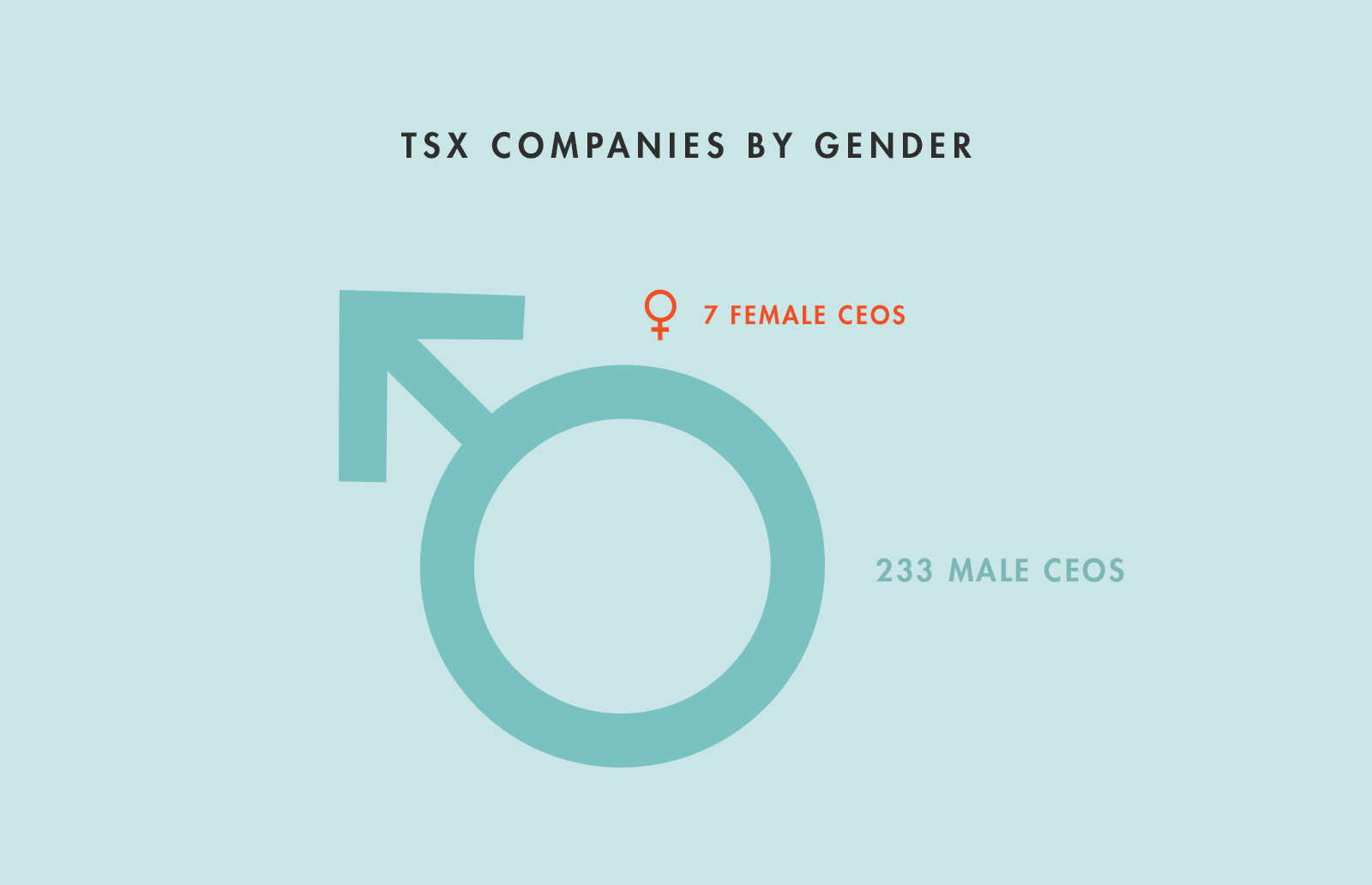
The story is even worse when you account for the size of the companies. Weighting by market capitalization (i.e., companies that are worth more are weighted proportionally against companies that are worth less), women lead less than 1.25% of the total of the Index. And not one of the 50 largest companies has a female CEO. In the United States, by comparison, three of the top 50 companies in the S&P 500—Oracle, PepsiCo, and IBM—are led by women.
"We Are the (Corporate) 99%"
Another thing I was interested in was the relative size of the companies. Are they basically the same size or do a few companies represent an enormous proportion of the Canadian economy? It turns out that inequality is massive, even among large corporations.
The largest market capitalization in the TSX Index is $107 billion CAD (Royal Bank of Canada), but the vast majority of the firms that make up the Index are far smaller than that: 89% of companies in the Index have market capitalizations below $20 billion CAD, and 97% (233 out of 240 companies) are below $50 billion CAD.
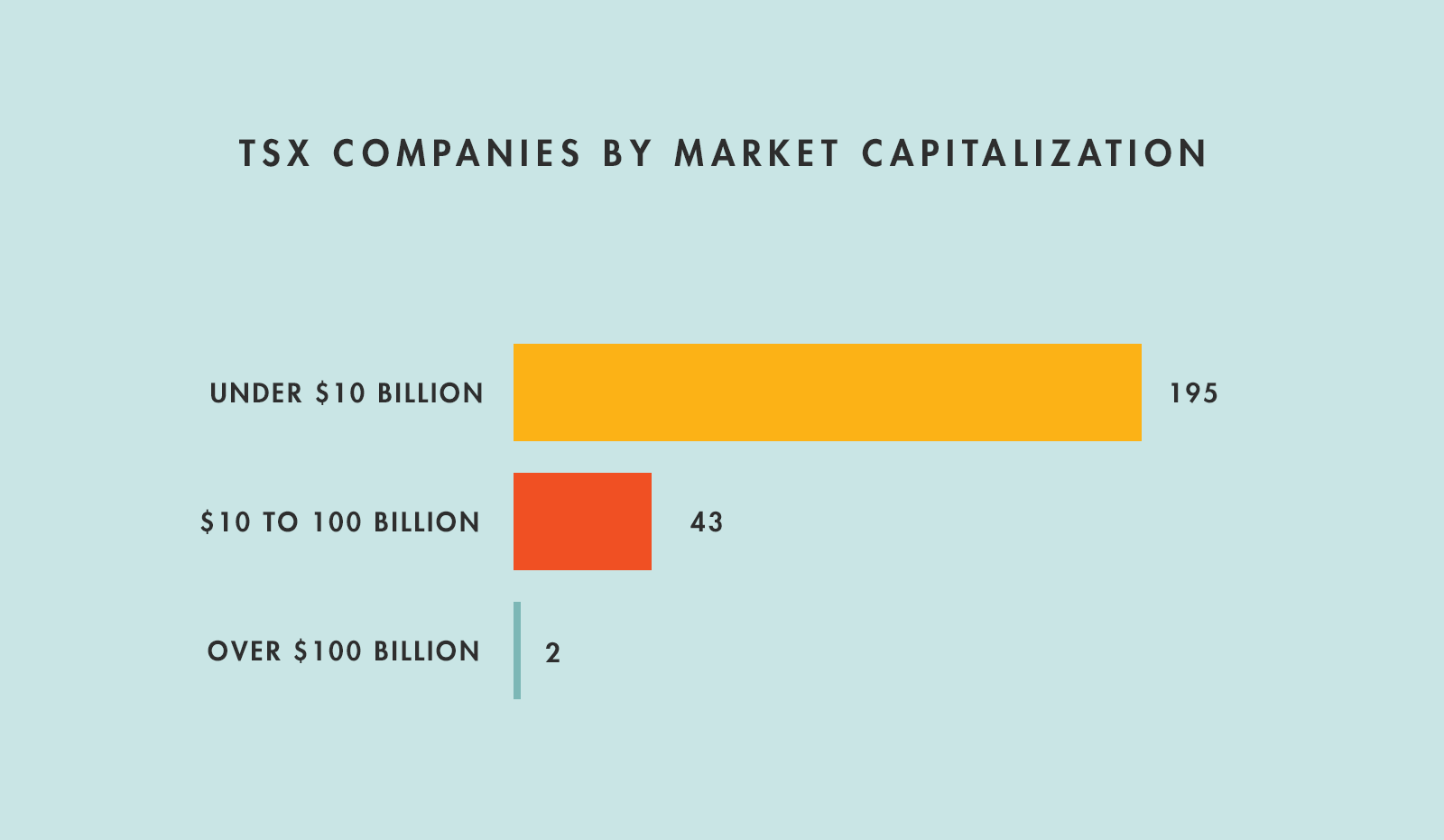
What does this mean? The Index is dominated by a handful of companies at the top. In particular, the top 10 companies in the Index make up more than a third of the total market capitalization.
A Tale of Two Cities (Though Maybe Not the Ones You Think)
So where is the economic capital of Canada? It basically comes down to two cities.
I looked at where the companies in the index are located. By number of companies, the mostly densely populated province is Ontario; 83 of the 240 companies (35%) are located there. This is actually a bit lower than you might expect given that Ontario is home to about 39% of the Canadian population. Still, Ontario is home to by far the most economic activity. In addition to having the largest cohort of companies, it also has the biggest share of market capitalization, largely because of the large financial institutions that occupy Toronto.
More surprising is the next largest group. Alberta is home to 69 of the 240 companies (29%) despite having only 12% of the Canadian population. You can thank Calgary's position as the urban centre of Canada's oil industry for that. Alberta, Calgary’s home province, has the distinction of being the only province with more-than-proportional representation in the Index.
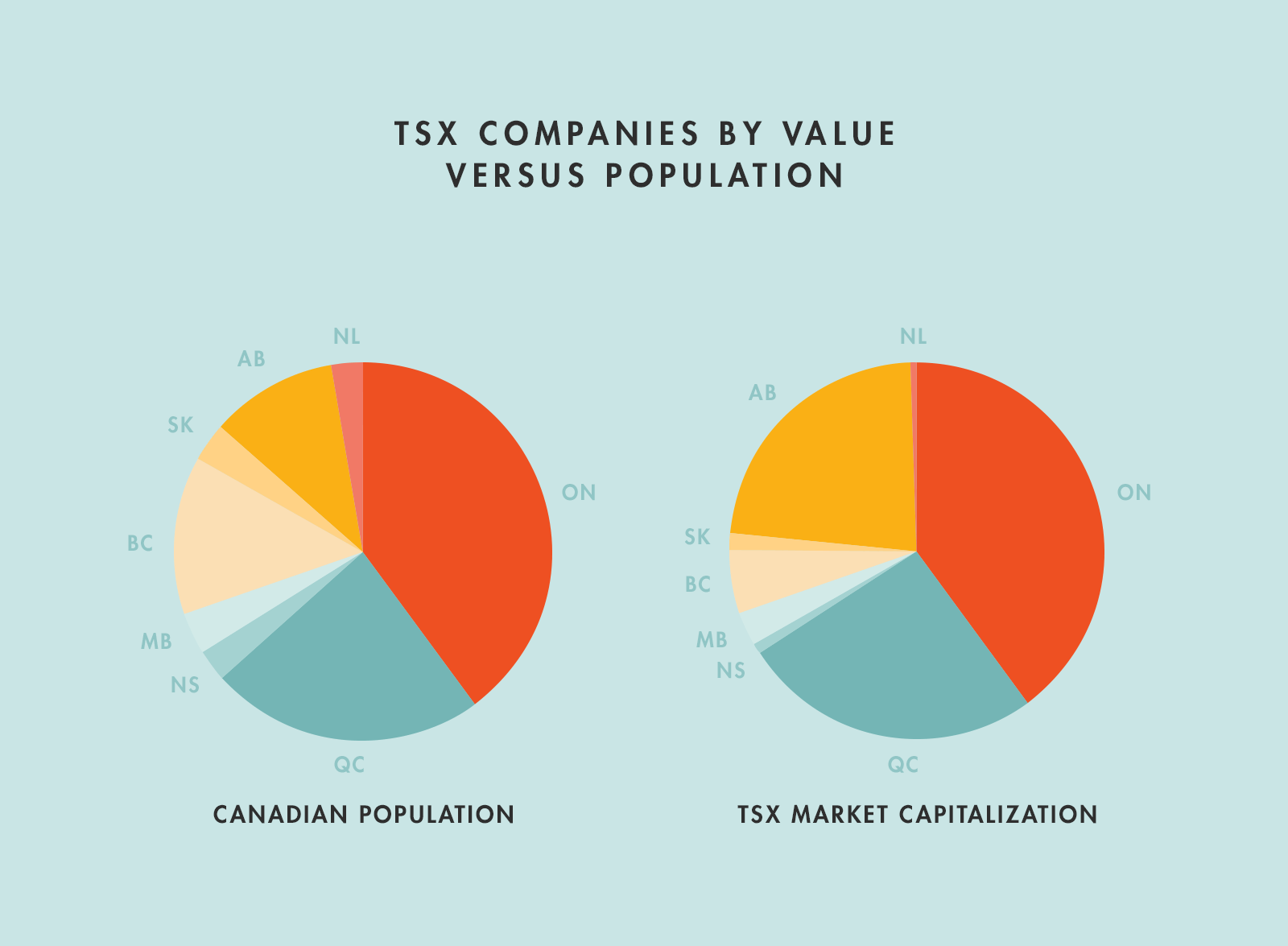
The TSX isn’t the Only Game in Town
Canada is a great place to live, and it has a vibrant economy. But its stock market is hopelessly lopsided. Sometimes it can feel as if investing in the TSX amounts to a bet on a few stodgy banks and old-guard energy companies, run almost exclusively by men who probably think alike because they rub shoulders in the same city. You’d think smart investors would want to break out of that mold. And yet, the majority of Canadians’ portfolios are held in domestic stocks—60% on average. Invest with Wealthsimple and we’ll create a portfolio that’s globally diversified, customized for your financial goals, and low-cost. Besides being more diverse and dynamic, your Wealthsimple portfolio comes with no headaches and nothing to manage.
Wealthsimple's education team is made up of writers and financial experts dedicated to making the world of finance easy to understand and not-at-all boring to read.









